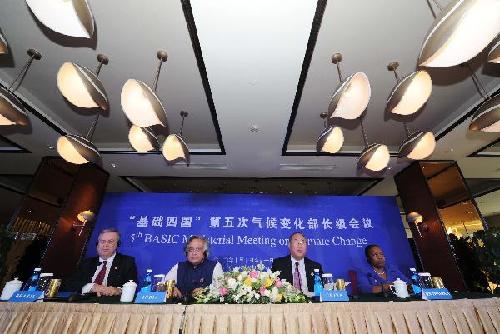|
 |
|
Xie Zhenhua (2nd R), deputy chief of Chinese National Development and Reform Commission, speaks at the press conference of the 5th BASIC Ministerial Meeting on Climate Change held in Tianjin, north China, Oct. 11, 2010. (Xinhua/Yue Yuewei) |
The BASIC countries - China, India, Brazil and South Africa - a block of four large developing countries, urged developed nations Monday to fulfill their obligations to help developing countries combat global warming.
In a joint statement, the four countries called on developed nations to commit to more ambitious emission reduction targets for the second commitment period of the Kyoto Protocol, after the 5th BASIC Ministerial Meeting on Climate Change ended?in Tianjin?Monday.
The BASIC nations urged developed countries that have not ratified the Kyoto Protocol to undertake comparable emission reduction targets under the United Nations Framework Convention on Climate Change (UNFCCC), the statement said.
At a press conference held after the two-day meeting, Jairam Ramesh, the minister of State, Environment and Forests of India, said, "The message we want to convey is that the developing countries are united on climate change," and that the BASIC group wants to play a constructive role in climate change talks.
Developed countries are directly responsible for the lack of progress in the United Nations talks on climate change and "we are the victims of climate change," he said.
The meeting was held following the fourth round of U.N. climate talks, which concluded here Saturday and involved climate change negotiators from 177 parties.
During the meeting, BASIC climate ministers, including Xie Zhenhua, deputy chairman of the National Development and Reform Commission of China, focused on issues relating to the Cancun Conference, which is to be held in November in Mexico.
The BASIC members agreed that the outcome of the upcoming summit should be based on a balance between and within the two negotiating tracks of the UNFCCC and the Kyoto Protocol.
"The outcome in Cancun should pave the way for a legally binding outcome next year in South Africa," which should not deviate from the mandate of the Bali Roadmap, the statement said.
The U.N. climate talks have "laid the solid ground for a good outcome in Cancun," it said.
Developed countries want agreements more than any others, but the commitments made by these developed countries, especially those in the Copenhagen Accord, under the principle of common and differentiated responsibility have not been fulfilled, said Ramesh.
"Progress should be made in Cancun for the establishment of an effective mechanism for technology development and transfer," said the statement, adding that dealing with adaptation is of great urgency in Cancun.
The key to success in Cancun is the allocation of the 30-billion-U.S.-dollar "fast start finance" that supports developing countries, the statement said.
However, participants at the meeting were concerned about the lack of transparency and relevant information, noting that the sources of funding must be "new and additional" to the existing funds.
Buyelwa Sonjica, minister of Water and Environmental Affairs of South Africa, and Luiz Machado, director general of the Department for Environment and Special Affairs at the Ministry of External Relations of Brazil, also participated in the meeting.
The Sixth BASIC Ministerial Meeting on Climate Change is scheduled for February 2011 in New Delhi, India, according to the statement.
|

